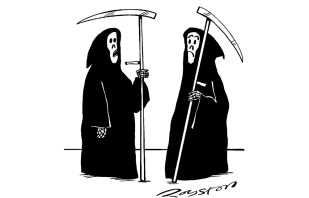Graeme Thomson has narrated this article for you to listen to.
‘At the record company meeting/ On their hands – at last! – a dead star!’ Back when Morrissey was more concerned with writing a decent lyric than sour internet tirades, ‘Paint a Vulgar Picture’ by the Smiths summed it all up rather neatly: a living pop star is all well and good, but a dead one is far less troublesome – and considerably more profitable. Some artists only really get going once they’re dead. Commercially speaking, Eva Cassidy’s entire career has been posthumous; the Van Gogh of the lustreless Radio 2 ballad.
The motive feels pure: a family’s wish to keep their sibling alive through her art
Death has been a boon to the pop industry since the year dot. Buddy Holly’s ‘It Doesn’t Matter Anymore’ and Eddie Cochran’s ‘Three Steps to Heaven’ reached number one in 1959 and 1960, respectively, hot on the heels of their untimely demise. Otis Redding’s ‘(Sittin’ On) the Dock of the Bay’ was rush released in January 1968, shortly after the soul singer died in a plane crash. Redding regarded the song as unfinished and had plans to re-record it. Stax put it out anyway.
Which brings us to the heart of the matter. The recycling of existing product, however scrappy, after an artist dies is a given. Tupac Shakur released four albums while alive and at least seven dead. David Bowie’s career is considerably busier than it was in the decade before his passing in 2016. From Elvis to Amy, the beat goes on.
More contentious is the completion and release of work which is unfinished when a musician dies. This is the case with two new album releases. Acclaimed and influential British electronic musician Sophie died in 2021, aged 34, from an accidental fall. Her second album, Sophie, has been completed by her brother, Benny Long, who worked as her recording engineer, with the assistance of their sister Emily.
An almost constant presence alongside Sophie in the studio, Long worked from the provisional 16-song track-list he’d discussed with her. For many of the songs only final mixing and mastering was required; others were less formed, and were built up from sketches and demos. Creative decisions typically signed off by the artist were by necessity made by those closest to her.
This merging of family and musical ties reminded me that when George Harrison died in November 2001, he had been working, intermittently, on his first studio album since 1987. As his health declined, and knowing that he wouldn’t complete the work in time, Harrison left detailed instructions for his son, Dhani, and his friend and producer ELO’s Jeff Lynne, to become the executors of his rock and roll will. A year after his death Brainwashed duly appeared, sounding remarkably like a pretty decent George Harrison album. In the kind of ironic twist he may have appreciated, death gave Harrison the impetus to finish a record he might have continued dithering over had he remained alive.
In Harrison’s case, he knew he was dying and could delegate accordingly. Sophie died suddenly and tragically. Nobody will ever quite know for sure what route her music may have taken had she lived. She may have met new collaborators, scrapped her demos, started afresh. Sophie can only ever be a highly educated guess at what her second album might have sounded like, but the motive feels pure: a family’s wish to keep their sibling alive through her art, and to fulfil her known creative impulses as best they can. ‘It comes down to, would she want this album to come out or would she not?’, Long recently told the New York Times. ‘And she definitely would.’ Long has stated that there will be no further albums.
AI will soon bring every dead singer back to life in the most unedifying ways
Sophie certainly feels more ethically sound than a dead John Lennon unwittingly contributing some squeaky old demos to create three ‘new’ Beatles singles; or the remaining members of the Doors taking some dodgy poetry readings by Jim Morrison, dubbing on new music and releasing it as An American Prayer seven years after Morrison’s death.
AI will soon bring every dead singer back to life in the most unedifying ways, but music isn’t the sole culprit. Numerous authors – from Tolkien to David Foster Wallace to John le Carré – have had major works compiled and published posthumously without their consent.

Back to the Smiths. The group’s former bass player Andy Rourke died last year. When he fell ill, he had been working with Kav Sandhu in Blitz Vega. Sandhu ‘promised his friend that he would complete the album they’d spent years working on’. And he has.
Northern Gentleman is out this week. Fair enough. Rourke was a musician, and musicians want their work to be heard. Would Rourke be happy with the final iteration of this committed blend of rock’n’roll, glam, trashy punk and electronica? Sandhu thinks so, and he is surely best placed to comment. He’s very probably right. The trouble is, no one will ever quite know for sure.
Sophie (Transgressive) and Northern Gentleman (CEN) are out now.








Comments